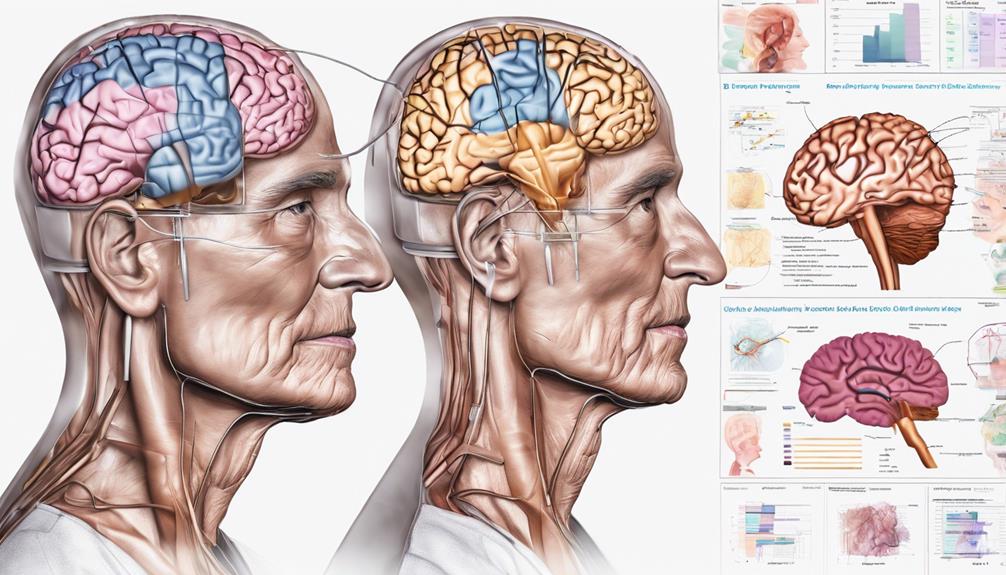The ADAS-Cog is a tool used to assess memory, language, praxis, and understanding commands in Alzheimer’s patients. Scores range from 0 to 70, with higher scores indicating more impairment. This evaluation accurately covers memory, language, orientation, and visuospatial skills, playing a vital role in creating personalized care plans. The ADAS-Cog is a reliable and sensitive measure, often preferred over the MMSE in trials. It helps track cognitive decline, assess treatment effectiveness, and measure cognitive dysfunction in Alzheimer’s patients. Widely utilized in research and clinical trials, the ADAS-Cog monitors changes in Alzheimer’s disease progression over time and evaluates the impact of treatments on cognition. Explore the significance of the ADAS-Cog in Alzheimer’s assessment with the following information.
Key Takeaways
- ADAS-Cog assesses memory, language, praxis, and understanding in Alzheimer's.
- Scores range from 0 to 70, higher scores indicating greater impairment.
- More sensitive and reliable than alternative tools, preferred in pharmaceutical trials.
- Tracks subtle cognitive changes over time, crucial in monitoring Alzheimer's.
- Essential for evaluating cognitive dysfunction, widely used in AD research and trials.
ADAS-COG Assesses Various Cognitive Functions
ADAS-Cog effectively evaluates a range of cognitive functions, including memory, language, praxis, and command understanding in individuals with Alzheimer's Disease. This assessment tool is essential in understanding the cognitive abilities of those affected by the disease.
When used in clinical settings, ADAS-Cog provides valuable insights into the level of cognitive impairment present in Alzheimer's patients. It's especially useful in detecting mild cognitive changes that might go unnoticed in other evaluations.
The Word Assessment used in ADAS-Cog helps healthcare professionals pinpoint specific areas of cognitive decline, aiding in accurate diagnosis and treatment planning.
Scoring System Ranges From 0-70 Points

The scoring system for the cognitive subscale of ADAS-Cog spans from 0 to 70 points, reflecting performance levels. This range allows a thorough evaluation of cognitive abilities in Alzheimer's disease patients.
Here are three key points about the scoring system:
- Higher scores on the ADAS-Cog indicate greater cognitive impairment, helping healthcare professionals understand the severity of the disease.
- The cognitive tasks assessed by ADAS-Cog cover essential areas such as memory, language, orientation, and visuospatial skills, providing a detailed overview of cognitive function.
- ADAS-Cog's scoring system enables a detailed evaluation, offering a more in-depth insight into cognitive abilities compared to simpler tests, which can be essential for tailored care plans.
Understanding the scoring system of ADAS-Cog is important for healthcare providers in diagnosing and monitoring cognitive decline in individuals with Alzheimer's disease.
More Sensitive and Reliable Than Others
Considered more discerning and dependable than alternative cognitive evaluation tools, the ADAS-Cog cognitive subscale stands out for its sensitivity and reliability in evaluating cognitive function in Alzheimer's disease. When appraising cognitive abilities in individuals with Alzheimer's, sensitivity and reliability are vital factors to ponder.
The ADAS-Cog cognitive subscale covers a wide range of cognitive domains, including language, memory, orientation, and visuospatial ability, providing a thorough evaluation that's sensitive to subtle changes. This sensitivity makes it a preferred choice over the Mini-Mental State Examination (MMSE) in pharmaceutical trials for Alzheimer's disease, where even minor cognitive alterations need to be detected accurately.
Furthermore, the ADAS-Cog cognitive subscale is less influenced by factors like educational level or language skills compared to the MMSE, making it a more reliable tool for evaluating cognitive function. Its ability to detect nuanced changes in cognitive abilities makes it invaluable in both research and clinical practice related to Alzheimer's disease.
In pharmaceutical trials, where precise evaluation of cognitive function is essential, the ADAS-Cog cognitive subscale's sensitivity and reliability shine through, making it a preferred choice for many clinicians and researchers.
Valuable Tool in Monitoring Cognitive Decline

Monitoring cognitive decline in individuals with Alzheimer's disease requires a reliable and sensitive tool that can accurately assess changes in cognitive abilities over time. The Alzheimer's Disease Assessment Scale Cognitive Subscale (ADAS-Cog) is an essential instrument in tracking the progression of cognitive decline in patients.
- Sensitive to Change: The ADAS-Cog scale is designed to detect even subtle changes in cognitive function, making it a valuable tool for monitoring the progression of Alzheimer's disease over time.
- Used in Clinical Trials: The ADAS-Cog is frequently utilized in clinical trials to evaluate the effectiveness of different treatments on cognitive function in individuals with Alzheimer's disease.
- Evaluates Various Cognitive Items: This scale includes tasks that evaluate memory, language, orientation, and praxis abilities, providing a thorough evaluation of cognitive function in patients.
Integral in Evaluating Alzheimers Disease
Shifting from the conversation on the value of the ADAS-Cog in monitoring cognitive decline, evaluating Alzheimer's disease, the cognitive subscale of the ADAS-Cog emerges as an important tool for evaluating cognitive dysfunction in individuals with Alzheimer's Disease.
The ADAS-Cog cognitive subscale, with its 11 tasks evaluating memory, language, praxis, and other cognitive functions, is widely used in Alzheimer's disease (AD) research and clinical trials. This subscale is essential for measuring changes over time in AD pathology and disease progression.
In clinical trials using subjects with Mild Cognitive Impairment (MCI) or AD, the ADAS-Cog is essential for evaluating treatment effects on cognitive abilities. Its sensitivity to disease severity and progression makes it the gold standard for evaluating cognitive changes in AD patients.
Frequently Asked Questions
What Is the Cognitive Subscale of the Alzheimer's Disease Assessment Scale?
We assess memory, language, praxis, and cognitive functions with the ADAS-Cog cognitive subscale. It's a reliable measure in Alzheimer's research, essential for monitoring disease progression and treatment effects. ADAS-Cog scores provide sensitive evaluation of cognitive decline.
What Is Cognitive Subscale?
Cognitive Subscale assesses memory, language, orientation, visuospatial ability, and executive functions. It's essential for evaluating cognitive impairment in patients. Scores range from 0 to 70, with higher scores indicating more dysfunction. It's commonly used in clinical trials for Alzheimer's treatments.
What Is the Scale for Assessing Alzheimer's Disease?
We use a scale to assess Alzheimer's Disease that evaluates memory, language, and praxis through 11 tasks. Higher scores indicate poorer cognitive performance. It's essential for evaluating treatments and detecting early changes.
What Is the Cognitive Score for Alzheimer's?
In Alzheimer's disease, the cognitive score reflects the level of impairment in memory, language, praxis, and orientation. This score ranges from 0 to 70 on the ADAS-Cog scale, with higher scores indicating more severe cognitive decline.
How Can Alzheimers Disease Assessment Scale Cognitive Subscale Help in Assessing Alzheimer’s Disease?
The Alzheimer’s Disease Assessment Scale Cognitive Subscale (ADAS-Cog) is a gold standard tool used to assess the cognitive decline in individuals with Alzheimer’s disease. It helps in evaluating memory, language, and problem-solving abilities, providing valuable insights into the progression of the disease. Understanding how ADAS-Cog works can unlock a better understanding of Alzheimer’s disease.
Conclusion
To sum up, the ADAS-COG is a powerful tool for evaluating cognitive function in individuals with Alzheimer's disease. Its thorough assessment of various cognitive functions sets it apart from other scales. With a scoring system ranging from 0-70 points, it provides valuable insights into the progression of the disease.
Remember, 'you can't judge a book by its cover,' just like you can't assess cognitive decline without the ADAS-COG. It's an essential component in monitoring and understanding Alzheimer's disease.









